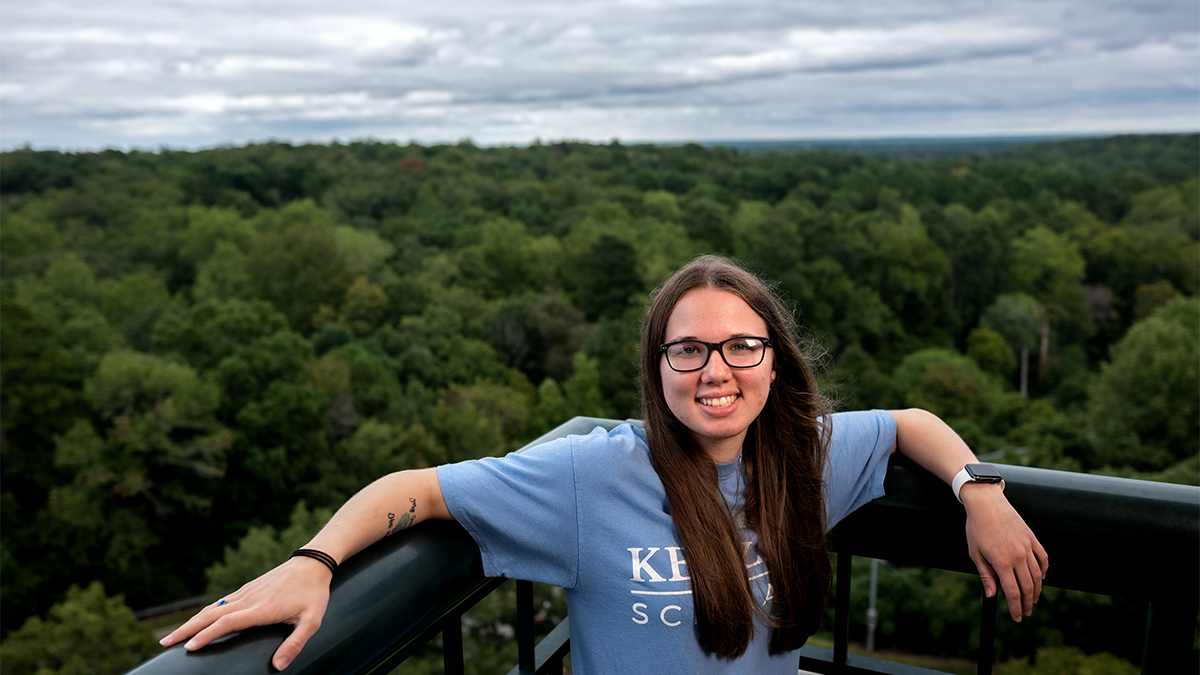Kessler Scholar finds a family
Emily Shipway belongs to the first cohort of this program, which supports rural first-generation college students.

A few days into her college experience at Carolina, Emily Shipway felt ready to quit.
“I don’t belong here,” thought the first-year student from rural Roseboro, North Carolina, a Sampson County town of a little over 1,000. “I’ll just pick up a job somewhere close to home.”
Most of Shipway’s family hail from the Roseboro area. Neither of her parents went to college, nor did any of her seven siblings. When she expressed doubts about college, her parents weren’t quite sure what to tell her. It wasn’t until Shipway connected with her Kessler Scholars cohort that she felt a sense of belonging.
The Kessler Scholars Program is designed to support first-generation, limited-income students. Shipway is part of the first cohort at Carolina, a group of 17 first-generation students, and she already views her fellow Kessler Scholars as family.
“I’ve loved the program,” Shipway said a few weeks into her first semester at Carolina. “I don’t think I’ve gone a day without being grateful for it because without it I don’t think I would have lasted.”
A key part of the Kessler Scholars experience for Carolina scholars is the six-week Summer Bridge transition program, a partnership with the Center for Student Success, where first-generation, limited-income students connect. When Shipway was a couple of days into the program, her anxiety boiled over. She called Candace Jones, the Kessler Scholars program coordinator at Carolina, and said she wanted to quit.
Jones, a former first-generation student herself, took Shipway to brunch, listened to her vent through tears and then gave Shipway the encouragement she needed.
“She was like, ‘I know that many first-gen college students feel like they’re at a loss. They don’t have their support from home, but I want you to know, I’m here for you always. Just remember everything is ‘figure-out-able.’ I’m going to be your mama bear,’” Shipway said, adding that Jones has always been there for her since that meeting.
From that moment, Shipway’s comfort grew and so did her friendships. Throughout the summer, the cohort participated in rope courses, lake visits and other activities that built trust and created a family atmosphere.
As Shipway’s fears about college life started to dissipate, the initial joy she felt over her acceptance to Carolina resurfaced. There’s a reason she chose to study at Carolina – a personal one.
Two summers ago in Roseboro, Shipway’s 6-month-old nephew suffered a head injury that required an emergency procedure. Local medical facilities weren’t equipped to handle the injury, but Shipway’s nephew was able to get the medical treatment he needed at UNC Hospitals in Chapel Hill.
The experience made Shipway consider a new career possibility.
“Hearing that there were no doctors in the area that were pediatric neurosurgeons, I thought, ‘What if I became a pediatric neurosurgeon?’ I love kids. I love neuroscience. I love doing things hands on. I’ve been told plenty of times to be a doctor,” Shipway said.
Pediatric neuroscience is by no means an easy field, and Shipway has had her share of doubts since stepping onto campus, but her Kessler Scholars cohort helps her feel less alone. The program has also empowered her to envision a future where she opens her own medical practice in her hometown.
“I think having Kessler Scholars is going to be my key to success,” Shipway said. “Getting through it, graduating at the end of the day, just knowing Kessler Scholars has my back. My family’s got my back here. Now I can truly embrace the Carolina life.”
UNC-Chapel HIll’s participation in the Kessler Scholar Program was supported by the Kessler Scholars Collaborative and the American Talent Initiative with funding support from the Judy and Fred Wilpon Family Foundation and Bloomberg Philanthropies (www.bloomberg.org).







